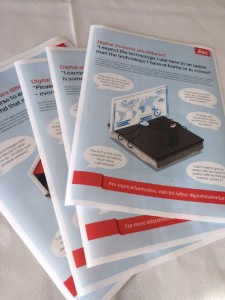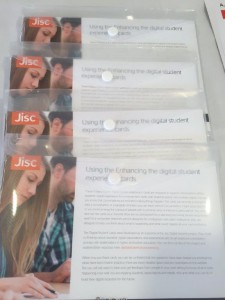From the work we have carried out over the past 3 years with Helen Beetham, Dave White, Rhona Sharpe, Liz Browne and Ellen Lessner, under the Digital Student project and the Change agents’ network, the development of the student digital experience is complex and should be informed by learners’ expectations and experiences of technology. Learners should have opportunities to share their ideas about how their digital experience can be improved. Presentations from learners to senior managers and governors can be powerful enablers for driving change. How many colleges have a student representative on their digital strategy working group? Feeding back to learners on how their ideas may or may not be taken forward is also important so their views are valued and you are closing the feedback loop. My recent presentation summarises the key findings from these projects.
When asking colleges the question – how do you currently gather learners’ expectations and experiences of technology?, there were some excellent examples of practice from short surveys in VLEs at the end of each module, learner voice surveys, focus groups, student rep meetings, digital literacy surveys, SPOC etc. Although when we discussed this in more detail, there is still a lack of emphasis on the digital aspects and also a lack of analysis and bringing together of the data collected to have a ‘digital lens’. A longitudinal view is also rarely available. Hence the work we are carrying out under the Digital Student Data Service.
Asking colleges, how do you engage your learners in the development of the digital environment/digital strategy? is a more difficult question to answer. At course level there are mechanisms and channels to encourage feedback, but less so at a strategic level. The importance of engaging student unions and class reps in these discussions was raised as something we need to do better. Look for opportunities to encourage learner participation in digital working groups for example.
Learners in our Digital student studies saw the digital experience as an opportunity to contribute and get involved. Digital engagement methods such as social media, padlets, twitter walls, vox pops etc are popular and once established can be used for other issues too. Digital students are different – it is important that the experience of different groups is represented. Learners can get involved in different ways e.g. advocate, researcher, representative, intern, change agent, project lead, buddy, mentor, designer. This is an issue which can help change relationships between staff and students.
There are some excellent examples of practice from colleges who are appointing digital leaders, digital ambassadors, digipals as a way of empowering students in discussions and decisions around their digital experience. Blackburn College, Procat, Portsmouth College and Barnet and Southgate College are all seeing the benefits of working in partnership with their learners to drive forward curriculum change with technology. See the presentation from the HE Digital Leaders course on Students as partners.
A reminder of the resources and guidance which is available to colleges and providers to support them with gathering their learners’ expectations and experiences of technology. These include:
– Digital Student card sort and guidance on running learner focus groups
– Digital Student learner profile form
– Digital Students are different posters
– Enhancing the student digital experience postcards
– Jisc – NUS Benchmarking the student digital experience
– Enhancing the student digital experience online guide
– Developing successful student-staff partnerships

I would like to hear your ideas on how you are engaging your learners. Please follow #digitalstudent to keep updated on the developments of the Digital Student project for skills and also around the developments of a possible digital student data service.

